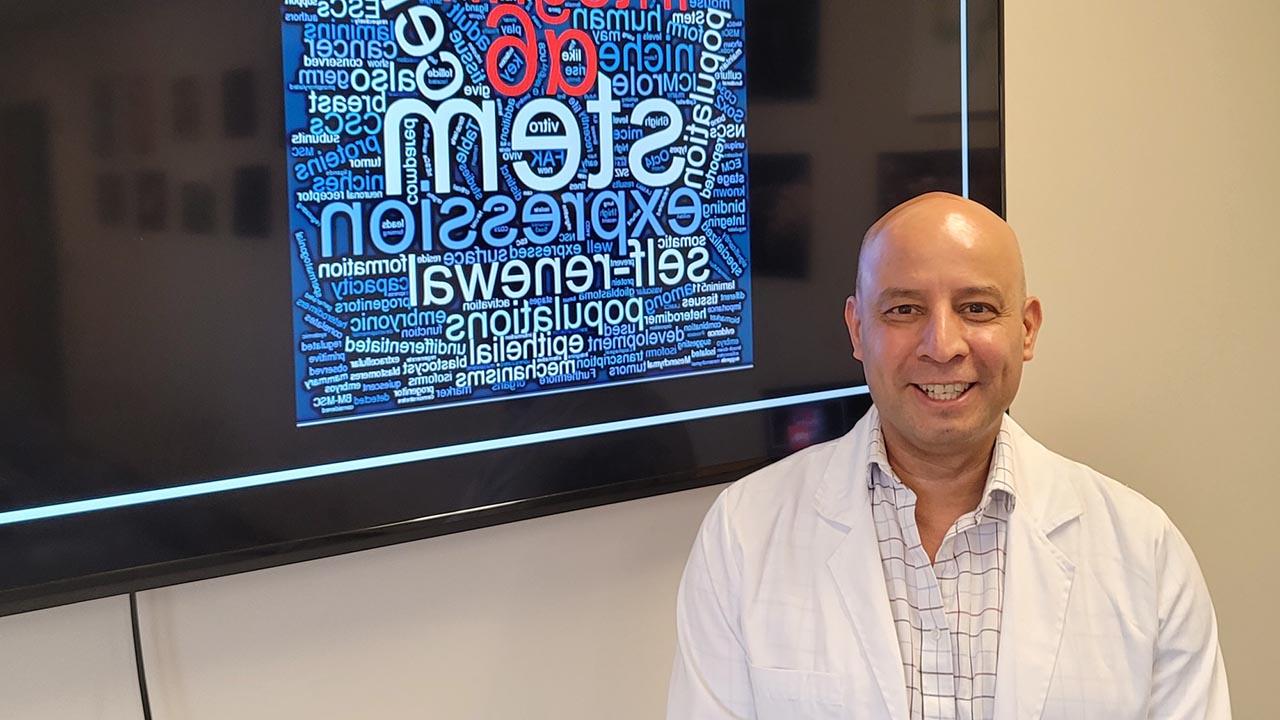OU professor studying effects of microgravity on human pluripotent stem cells
研究 could lead to better understanding of its effects on humans in space, 再生医学的潜在用途

Kadijah托马斯 works with Professor Luis Villa-Diaz in the lab.

杰西卡·布拉德福德在实验室工作.

保罗·科兹洛夫斯基 works with Professor Luis Villa-Diaz in the lab.

扫罗鲁伊斯在实验室工作.

随着NASA准备在2025年重返月球, Dr. Luis Villa-Diaz and a team of researchers at 十大菠菜台子 have been studying the effects of microgravity — the closest that we can get on Earth to zero gravity, like that found on the International Space Station — on human pluripotent stem cells (hPSC). These cells have the ability to remain undifferentiated by self-renewal mechanisms or to differentiate into virtually any cell type in the human body.
Dr. Villa-Diaz’s lab has been doing research with human pluripotent stem cells like embryonic stem cells approved by the federal government and with induced-pluripotent stem cells generated in his lab.
“在我们重返月球或殖民火星之前, we need to investigate what’s going to happen to every single cell in the body in that environment,维拉-迪亚兹说, an assistant professor in the Biological 科学 and Bioengineering departments at 十大菠菜台子. 在正常重力下, 造血干细胞能够分化, but we wanted to see whether they are able to differentiate in space or under microgravity conditions. 我们发现确实如此,但程度较低. 我们还观察到它们增殖得更快. This confirms that microgravity enhances their self-renewal, but prevents differentiation.”
This indicates that the behavior of hPSCs is different in microgravity conditions.
This research, which was published this month in npj微重力 — an open-access scientific journal dedicated to covering important research in the life sciences, 物理科学, and engineering fields — could lead to a better understanding of the effects of microgravity on humans in space, as well as its potential use in personalized and regenerative medicine.
“One potential application of this research on Earth is that we could produce more pluripotent stem cells in a faster way if we grow them in microgravity conditions,维拉-迪亚兹说. “For example, hPSCs can be induced to make cardiomyocytes, which are cells of the heart. If I have a heart attack, billions of my cardiomyocytes are going to die. 在未来, if we want to regenerate the heart with cell transplantation, we will need to replace those cells with healthy cells, and the faster way to get that large number of cells required would be through microgravity.”
 |
Working in collaboration with graduate and undergraduate students and faculty from the Department of Biological 科学, 计算机科学与工程系, and Department of Bioengineering at 十大菠菜台子, Villa-Diaz designed a fast-rotating 2-D clinostat to study the biological effects of simulated microgravity on hPSCs.
“We put the cells into rotation in this device in an incubator and then we grow them and see what happens,维拉-迪亚兹说. “我们种植它们5天,然后停止. What we observed is their proliferation actually increased compared to normal gravity conditions.
“At the same time, another experiment we did is we induced differentiation during the five days. What we observed is the cells are able to start differentiating when we provide these signals in microgravity; however, 与正常情况相比, 它们的分化受到阻碍. Microgravity is kind of fighting the differentiation because it’s actually enhancing their self-renewal and preventing differentiation.”
使用rna测序分析, 研究人员发现PSMD11, a protein coding gene whose role is to degrade other proteins — particularly those used in cell differentiation — was highly expressed in almost every single pathway modified under microgravity conditions.
“Essentially, PSMD11 is keeping them from differentiating,维拉-迪亚兹说. “If we can figure out a way to ‘turn it down,’ we can induce differentiation in microgravity.”
除了, learning more about the role of the PSMD11 gene on differentiation in normal stem cells could also lead to a greater understanding of its impact on abnormal stem cells, 比如癌症干细胞.
“If microgravity enhances self-renewal in cancerous cells and we have determined the mechanism that does that, we can start targeting those particular signaling mechanisms and prevent their proliferation,维拉-迪亚兹说. “This is important because if microgravity or zero gravity affects cancer stem cells in the same manner that hPSCs, it would have bad implications for the health of astronauts in space.”
The research is being supported by funding from the Michigan Space Grant Consortium, 十大菠菜台子REF资助, and a grant from the National Science Foundation.


 2022年7月21日
2022年7月21日